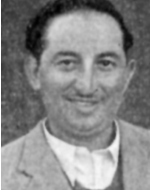Shilak, Moshe-Ya’akov (Monique)
Moshe, son of Sarah and Zvi-Avraham, was born on May 7, 1924 in Poland, in the city of Kalisz, Lodz, where he studied in an elementary and high school in his city. The outbreak of the war (September 1939), many of them fled the city, and the city was occupied by the Germans immediately after the war, and most of the Jews were then concentrated in the municipal market area and from there were deported to the Generalgouvernement. Until the end of the war, almost all the Jews of Kalisz were killed, and Moshe and his family were captured and deported to the camps. Who had been separated from his parents and spent time in the camps in Poland and Germany, twice tried to escape and was caught, but a few months before the liberation he managed to escape by jumping off the train as he galloped, and all his teeth were broken.Then the war ended, Moshe returned to his hometown, He was a member of the Bericha movement and was one of the organizers of the aliyah movement and was mainly involved in smuggling survivors through the borders. He was injured several times when he escaped from the border guards but did not give up, and continued this work until his turn to immigrate to the Land of Israel. In April 1946 he reached the Italian port of La Spezia. The immigrants planned to board the ships Dov Hoz and Fadah and Eliahu Golomb, which were purchased by the Haganah’s Mossad Le’Aliya Bet. The events related to the voyage of the two ships were known as the La Spezia affair. The affair began when the British, who controlled parts of Italy at the time, tried to prevent the ships from sailing. The immigrants were prepared for a protracted struggle and began a three-day hunger strike, a strike Moshe was one of its organizers. The immigrants joined, as a sign of solidarity, the leaders of the Jewish community in Palestine. The affair was made public when the Nuremberg trials were being conducted against Nazi criminals, provoked widespread public and media echoes and embarrassed the British. Under pressure from world public opinion and after protracted negotiations, the British had to surrender and allow the ships to sail. Dov Hoz, with 675 Ma’apilim, including Moshe, and Eliahu Golomb with 339 immigrants on their way to Eretz Israel on May 8, 1946. Five days later, Upon arrival, Moshe began agricultural work in Pardes Hannah and Karkur. He then moved in with his relatives in the Shapira neighborhood of Tel Aviv and worked as a stopper in the building. During his free time, he studied Hebrew together with his fellow camp inmates. Moshe was active in the Haganah shortly after his arrival in Israel. At the beginning of the War of Independence, he enlisted in the Palmach and served in the Fourth Battalion (“the burglars”) in the framework of the “Harel” Brigade – the 10th Brigade in the Hagana. And Kiryat Anavim, where many of the shells were fired from the beginning of the War of Independence On June 10, 1948, on the eve of the first truce in the war, the Jordanian army bombarded Kiryat Anavim with great force. The food, where the “Harel” fighters stood, and the shrapnel scattered in all directions led to the death of about ten fighters and the serious injury of many Moshe was among the wounded in the shelling and was rushed to the hospital, but two days later, on the 12th of June 1948, he died of his wounds. He was twenty-four years old. Moshe was buried in the temporary cemetery in the Sanhedria neighborhood of Jerusalem. BThe 16th of Cheshvan 5711 (15.11.1951) was transferred to eternal rest in the military cemetery on Mount Herzl, Jerusalem. This hero is a “last scion”. The survivors of the Holocaust are survivors of the Holocaust who survived the last remnant of their nuclear family (parents, brothers, sisters, sons and daughters) who experienced the Holocaust in the ghettos and / or concentration camps and / or in hiding and hiding in territories occupied by the Nazis and / Or in combat alongside members of the underground movements or partisans in the Nazi-occupied territories who immigrated to Israel during or after World War II, wore uniforms and fell in the Israeli army.
